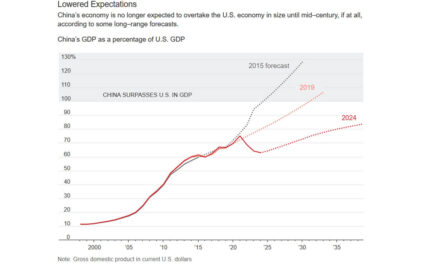
Is Chinese Telecom Deploying Bugged Equipment All Over the World?
A Chinese telecom company that was caught spying on the U.S. telecommunications network six years ago and was shut out from U.S. carriers, is quickly dominating other global networks.
Huawei Technologies Co. offers networking and telecommunication equipment and services to carriers across the world.
The family-owned business “Union Wireless, a 103-year-old carrier that provides telephone and wireless service to 50,000 customers in five Western states, is singing its praises. Four years ago, Union turned to Huawei after its previous equipment vendor fell behind schedule on a critical network upgrade, says Brian Woody, customer relations chief,” writes Wall Street Journal.
According to Woody, Huawei “worries about getting the problem fixed first and then worries about getting paid.”
But is this because they are secretly spying and collecting intel on the network while at work?
“Huawei appeared shut out of the U.S. six years ago after congressional investigators determined that its equipment could be used for spying or crippling the U.S. telecommunications network. Their conclusions and recommendations, delivered in a report in 2012 just as Huawei was gaining traction in the U.S., effectively killed Huawei’s chances to win business from major U.S. carriers. There was no law saying they couldn’t partner with Huawei, but the political costs could have been steep,” writes WSJ.
However, the number of competitors to Huawei is only getting smaller. Huawei has expanded to 170 countries and has 45 of the 50 world’s biggest wireless carriers as its customers.
Woody of Union Wireless said he has only two other competing suppliers to pick from, versus the five from four years ago.
Huawei had $75 billion in revenue last year, which is more than double than its last year’s revenues. The company is also rapidly expanding its smartphone business.
The company was founded by Ren Zhengfei, a former engineer for China’s communist People’s Liberation Army. This evidently rose suspicions early on.
Also, the company is a notorious copy-cat telecom and has reverse engineered their competitors’ services and products. Cisco sued the telecom company in 2003 and accused “Huawei of copying router code down to identical model numbers to make it easier for Cisco customers to switch to less expensive Huawei versions,” according to WSJ.
Not only is Washington concerned because of its history with Huawei, but the stiffening competition also presents a problem. Telecom networks are getting ready to invest on a massive network enhancement in the near future. With fewer suppliers, the more expensive these projects will be.
“This comes just as big U.S. carriers are expected to invest about $275 billion over seven years to deploy fifth generation, or 5G, networks that can carry huge amounts of data for high-quality mobile video and self-driving cars, according to Accenture. Early commercial deployments of the technology are to start later this year,” writes WSJ.
Not to mention, U.S. carriers may be desperate enough to turn to Huawei.
U.S. Lawmakers are especially concerned.
“Last month, members of the Senate and House intelligence committees sent a letter asking the Federal Communications Commission to review any relationship with Huawei and requested that the FCC get briefed on the security concerns raised in 2012. The letter also raised concerns about Huawei’s growing smartphone business, now the world’s No. 3 brand behind Samsung Electronics Co. and Apple Inc,” writes WSJ.
Allegedly AT&T almost made a deal with Huawei and was going to sell the Chinese company’s smartphones, but ultimately walked away from the deal.
Huawei already sells its products to U.S. customers through Amazon and Best Buy online.
“Huawei has proven itself by delivering premium devices with integrity globally and in the U.S. market,” said Huawei spokesman.
Huawei also claims that the company doesn’t use its services and products to spy in networks.
Its “global business is testament to the fact that Huawei is not a vehicle for any government or any agency of putting surveillance on another country,” said Ken Hu, one of Huawei’s chief executives.
Another Chinese telecom company, ZTE was also included in a report from the U.S. House Intelligence Committee which called both ZTE and Huawei a “national security threat.”
“Based on available classified and unclassified information, Huawei and ZTE cannot be trusted to be free of foreign state influence and thus pose a security threat to the United States and to our systems. The United States should view with suspicion the continued penetration of the U.S. telecommunications market by Chinese telecommunications companies. The Committee on Foreign Investment in the United States (CFIUS) must block acquisitions, takeovers, or mergers involving Huawei and ZTE given the threat to U.S. national security interests. U.S. government systems, particularly sensitive systems, should not include Huawei or ZTE equipment, including component parts. Similarly, government contractors—particularly those working on contracts for sensitive U.S. programs—should exclude ZTE or Huawei equipment in their systems,” according to the report.
Author’s note: This is scary stuff. Communications interception is a powerful means of intelligence gathering and this can be leveraged militarily and in the commercial world too. These companies (Huawei and others) have multiple links to People’s Liberation Army (PLA) and are using their affordable equipment to spy on other countries. This equipment is quickly being spread all over the world, so the power they might achieve is immeasurable.
Editor’s note: Think about it. Direct access to leadership communications in a great many countries, without the risk of being caught. Information is power.
























Joe Gilbertson: where are you going with these threats? My free speech is facing intimidation, sometimes physical threats. Is this…
NOT BUSTED. You didn't have to say it. That is what I meant in the above post from me. But…
Just another ruse for taking jabs at Biden through alleged short comings of his. Ten days remaining in Biden's term…
I never said I WANT China to continue to own Panama. You made that up. First,I didn’t say it. Second.…
I absolutely do Not in any way, shape or manner fabricate ANYTHING you say. I do and will always tell…